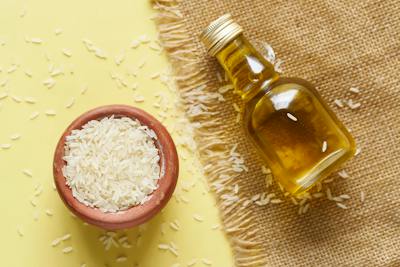What is Rice Bran Oil?
Rice bran oil is obtained using the tough external brown coating of rice that remains following the dust or rice husk has been removed. It’s been well recognized for its higher smoke point of 232 °C (450 °F) plus its mild flavor, which makes it suitable for elevated cooking techniques and temperatures like stir-frying as well as deep-frying. Considering a variety of factors, rice bran oil is one of the purest and healthiest cooking oils available.
For starters, it has an optimum ratio of polyunsaturated fats (PUFA) to monounsaturated fats (MUFA). Rice Bran Oil has about a 1:1 ratio of polyunsaturated fats to monounsaturated fats. Rice bran oil is high in Vitamin E, and antioxidants because it is manufactured from the bran. This is inexpensive in comparison to certain other culinary oils and may be manufactured in Asia. It is scientifically known as “Oryza Sativa.” It is widely used as cooking oil in Asian nations, including Pakistan, Korea, India, especially China.
Rice bran oil is among the cleanest cooking oils accessible. It contains an optimum polyunsaturated and monounsaturated lipid composition, rendering it great for strong cardiovascular health. Rice bran oil provides a variety of health advantages and has been shown to be beneficial to the epidermis. Rice bran oil contains Vitamin E, which promotes keeping your skin smooth, elastic, and blemish-free.
Rice bran contains vitamin E, which enhances your health and enables your system to combat infections as well as other frequent illnesses. Rice bran oil assists control your body weight in line, and if you’re on a weight-loss regimen, you may include rice bran oil in daily meals. Rice bran oil also helps to alleviate allergic responses in the body.
Benefits of Rice Bran Oil
The exterior bran or shell of grains of rice is used to obtain rice bran oil. Owing to its strong smoke point, RBO is ideal for high-heat preparation and is frequently employed in numerous Southern and Eastern Asian dishes.
In complement to its gourmet use and distinct flavor, rice bran oil provides a number of health advantages that have been scientifically proven.
Rice bran oil is high in nutrients and vitamins. Consumption of rice bran oil may provide a variety of health advantages, according to research:
1. Helps in Preventing Cancer
Rice bran oil is full of antioxidants, which may be found in different doses of vitamin E and also substances such as flavanols. Rice bran oil contains a lot of Vitamin E, including tocopherol and also tocotrienol. Vitamin E is stated to act as an antioxidant, which implies that it neutralizes free radicals (dangerous byproducts of cellular metabolism that can lead normal cells to change into malignant cells) in the body. As a result, consuming this rice bran lowers your risk of acquiring many forms of cancer.
2. Can Help with Acne-Prone Skin and Skin lightening
Squalene is a chemical found in rice bran oil. It absorbs quickly into the skin and keeps it soft, flexible, and pleasant.
3. Reduce Cholesterol
People with elevated cholesterol may benefit from replacing rice bran oil with other lipids in their regimen. Many research has shown that it can help decrease cholesterol. This impact might be attributed to the high quantity of Vitamin E found in rice bran oil.
4. Reduce Blood Pressure
Rice bran oil also helps decrease heart rate, particularly when combined with antihypertensive medicine. According to one research, combining this oil with sesame oil led to a considerable drop in blood pressure as well as cholesterol.
5. Blood Sugar Control
In particular to decreasing cholesterol or blood pressure, RBO may help persons with Type II diabetes control their blood sugar levels. After 4 weeks, a mixture of 80% rice bran oil and 20% sesame oil demonstrated a substantial decrease in fasting and postprandial glucose indicators in randomized research.
6. Dental Wellness
If employed for oil drawing, rice bran oil might improve your smell. Although sesame oil has historically been utilized in oil drawing, rice bran oil has been discovered to be useful in treating halitosis (bad breath) when utilized.
7. Rice Bran Oil Protects Against Allergies
Rice bran oil is often non-allergenic. As a result, when used in cooking, rice bran oil will not trigger allergic responses and can also help to soothe your body’s allergic response system. As a result, it inhibits sensitization to other uncommon allergens.
8. Weight Loss Benefits of Rice Bran Oil
Although rice bran oil is theoretically rich in calories, its thickness absorbs only around 20% of the oil. While less oil is taken, the dish preserves its natural flavor while simultaneously providing the health advantages of RBO. Rice bran oil contains fewer calories than typical vegetable oils. Prepare with rice bran oil if you want to regulate your appetite or are seeking ways to lose weight.
9. Rice Bran Oil as a Health Protector – Immunity Stimulant
Antioxidants are abundant in vitamin E, which is found in rice bran oil. It aids in the enhancement of your defenses. TRF’s antioxidant qualities can potentially have a variety of beneficial benefits on cellular viability.
10. Fat Content in Rice Bran Oil
Oils with an equal percentage of saturated fats, monounsaturated fats, plus polyunsaturated fats are always recommended by the National Institute of Nutrition and the Indian Council of Medical Research. RBO has a fatty acid content that is harmonious and near to this proportion. Trans-fats are also absent in rice bran oil.
11. Rice Bran Oil is beneficial to Kidney Stone Sufferers
Rice Bran could also aid in the reduction of absorption of calcium. As a result, this may aid in the prevention of some forms of kidney stones.
Nutritional Value of Rice Bran Oil
Rice bran oil has recently gained appeal and is extensively utilized as a cooking oil owing to its high purity, long shelf life, plus the appropriate ratio of fatty acids, and a plethora of antioxidants. This has a moderate fluidity and a high smoke point, making it an excellent frying oil.
Rice bran oil is obtained from the outermost surface of the rice, including brown rice, white rice, and other such forms of rice, all of which are excellent providers of carbohydrates; nevertheless, rice bran oil includes no carbs. Rice bran oil contains a high concentration of healthy unsaturated fatty acids, including monounsaturated fatty acids (5 grams) and polyunsaturated fatty acids (4.8 grams) per serving, which help to raise HDL (good) cholesterol levels while lowering LDL (bad) cholesterol, as well as 2.7 grams of saturated fatty acids.
It contains vitamin E –tocopherols & tocotrienols – as well as a large number of active phytonutrients such as:
- phytosterols,
- -oryzanol,
- squalene, and
- triterpene alcohols.
Rice bran oil has indeed been demonstrated to drastically lower Cholesterol levels, heart rate, and glucose levels, as well as the risk of inflammatory or metabolic illness. Aside from these benefits, it is well-known for boosting the defense system and slowing the progression of prematurely aging and age-related neurological illnesses.
Olive Oil vs. Rice Bran Oil
Rice bran oil has been shown to provide more health advantages than olive oil, including:
Rice bran oil has higher vitamin E, namely the bioactive compounds tocopherol and tocotrienol, whereas olive oil includes relatively little. Tocopherol, a powerful antioxidant found in rice bran oil, reduces oxidative strain, slows aging, and prevents pimples and hyperpigmentation.
Rice bran oil includes a high concentration of the beneficial chemical oryzanol, which is absent in olive oil but contains a high concentration of DHA and EHA, all of which are known to promote cardiovascular health. Rice bran oil contains the unique chemical oryzanol, which has been shown to decrease LDL cholesterol and inflammation.
Rice bran oil has a longer shelf life than all other cooking oils, although olive oil is particularly fragile and spoils rapidly.
When opposed to olive oil, rice bran oil has a higher smoke point, making it suited for all sorts of cooking. Because of its mild flavor that does not overshadow a meal, it is even good for cooking.
Although rice bran oil appears to be a better choice than olive oil, it is always advisable to use rice bran oil for sizzling and stir-frying while olive oil for salad dressing and sprinkling overcooked veggies.
Rice Bran Oil vs. Other Oils
| Oils | Distinction |
| Vanaspati | High Levels of Saturated Fats and contains undesirable trans fats. |
| Sunflower Oil | Very high levels of Poly-Unsaturated fats than the recommended levels. |
| Peanut Oil | Groundnut Oils lacks some antioxidants and essential nutrients |
| Coconut Oil | High in calories and triglycerides, both in large amounts are bad for health. |
| Olive Oil | Has a near-ideal fat profile but it is not suitable for frying as it has a very low smoke point and is expensive as compared to other oils |
| Rice Bran Oil | Balanced fatty acid profile
Full of Antioxidants and essential nutrients Helps in maintaining a Healthy Heart |
Conclusion
Rice bran oil, derived from the outermost surface of the husk, is flexible and simple to incorporate vegetable oil into the diet due to its high smoke point and mild flavor. It has grown in popularity in recent years because of its numerous health advantages, which include better cardiovascular health, sugar levels and blood pressure regulation, cancer prevention, boosted immunity, and epidermal health. Moreover, it has great antioxidant, anti-inflammatory, as well as anti-cancer properties, so gain the health benefits by using this healthy oil in your usual cooking.

